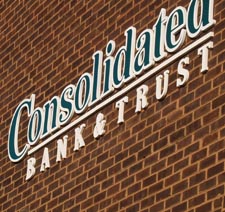 The recent troubles of a Richmond bank are once again preventing a West Virginia holding company from paying a dividend to one of its most powerful shareholders: the federal government.
The recent troubles of a Richmond bank are once again preventing a West Virginia holding company from paying a dividend to one of its most powerful shareholders: the federal government.
Premier Financial Bancorp, the West Virginia parent of Richmond-based Consolidated Bank & Trust said yesterday that for the second time in six months it is not allowed to pay its TARP dividend due to the U.S. Treasury because of restrictions included in Consolidated’s written agreement with banking regulators.
Consolidated, one of Richmond’s oldest financial institutions, in July entered into an agreement with the Federal Reserve Bank of Richmond and the Virginia Bureau of Financial Institutions aimed at improving its credit quality and lending practices.
But part of that agreement says that Premier must receive permission before paying dividends. That includes dividends to its regular shareholders and the Treasury.
The federal government became a Premier shareholder in October 2009 when the company received $22.25 million in TARP funds through the Capital Purchase Program. As a result, Treasury owns 22,252 preferred shares of Premier, on which a quarterly dividend is supposed be paid on the 15th of February, May, August and November.
The snag leaves Premier in a strange spot, because it has been steadily profitable and would otherwise be in a position to pay dividends.
In addition the Treasury not getting its due, Premier’s regular shareholders get put on the back burner until the government gets what it is owed.
The TARP program requires all missed quarterly dividends to be declared and paid before any dividends to common stockholders can be resumed.
Premier has missed its past two TARP dividend payments. If any TARP participant fails to make six dividend payments to the Treasury, the TARP programs allows the federal government to take two seats on said bank’s board of directors.
The right to elect directors would end when dividends have been paid in full for four consecutive dividend periods.
Premier CEO Robert Walker has previously told BizSense that the company is looking create a new bank, Premier Bank, into which Consolidated will be folded, thereby hopefully eliminating the written agreement and returning to dividends as usual.
That plan is still in the works.
 The recent troubles of a Richmond bank are once again preventing a West Virginia holding company from paying a dividend to one of its most powerful shareholders: the federal government.
The recent troubles of a Richmond bank are once again preventing a West Virginia holding company from paying a dividend to one of its most powerful shareholders: the federal government.
Premier Financial Bancorp, the West Virginia parent of Richmond-based Consolidated Bank & Trust said yesterday that for the second time in six months it is not allowed to pay its TARP dividend due to the U.S. Treasury because of restrictions included in Consolidated’s written agreement with banking regulators.
Consolidated, one of Richmond’s oldest financial institutions, in July entered into an agreement with the Federal Reserve Bank of Richmond and the Virginia Bureau of Financial Institutions aimed at improving its credit quality and lending practices.
But part of that agreement says that Premier must receive permission before paying dividends. That includes dividends to its regular shareholders and the Treasury.
The federal government became a Premier shareholder in October 2009 when the company received $22.25 million in TARP funds through the Capital Purchase Program. As a result, Treasury owns 22,252 preferred shares of Premier, on which a quarterly dividend is supposed be paid on the 15th of February, May, August and November.
The snag leaves Premier in a strange spot, because it has been steadily profitable and would otherwise be in a position to pay dividends.
In addition the Treasury not getting its due, Premier’s regular shareholders get put on the back burner until the government gets what it is owed.
The TARP program requires all missed quarterly dividends to be declared and paid before any dividends to common stockholders can be resumed.
Premier has missed its past two TARP dividend payments. If any TARP participant fails to make six dividend payments to the Treasury, the TARP programs allows the federal government to take two seats on said bank’s board of directors.
The right to elect directors would end when dividends have been paid in full for four consecutive dividend periods.
Premier CEO Robert Walker has previously told BizSense that the company is looking create a new bank, Premier Bank, into which Consolidated will be folded, thereby hopefully eliminating the written agreement and returning to dividends as usual.
That plan is still in the works.


